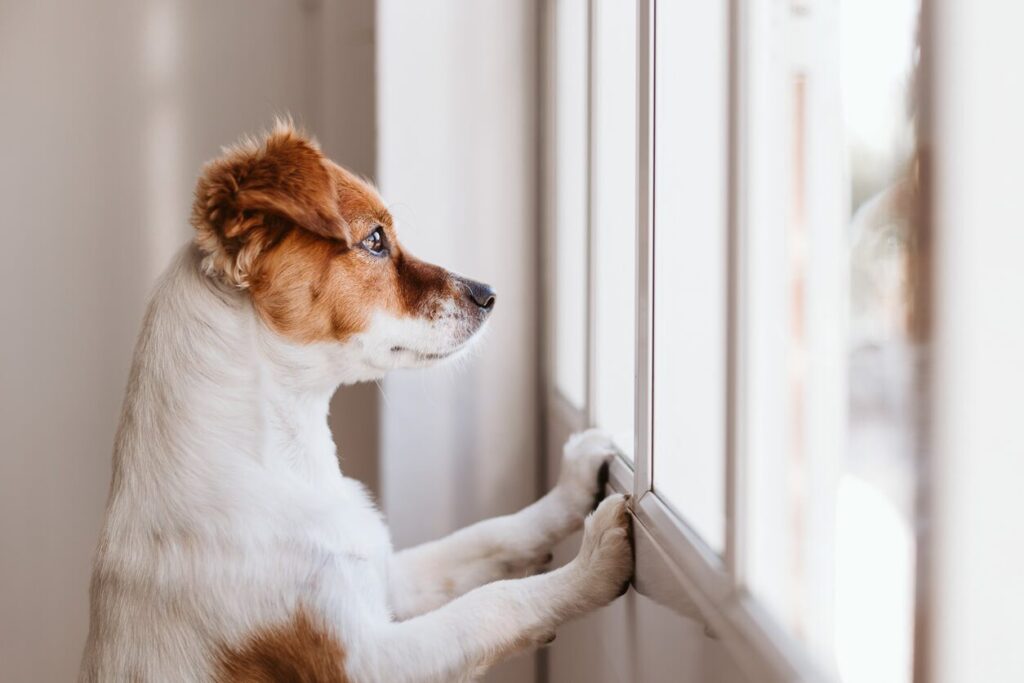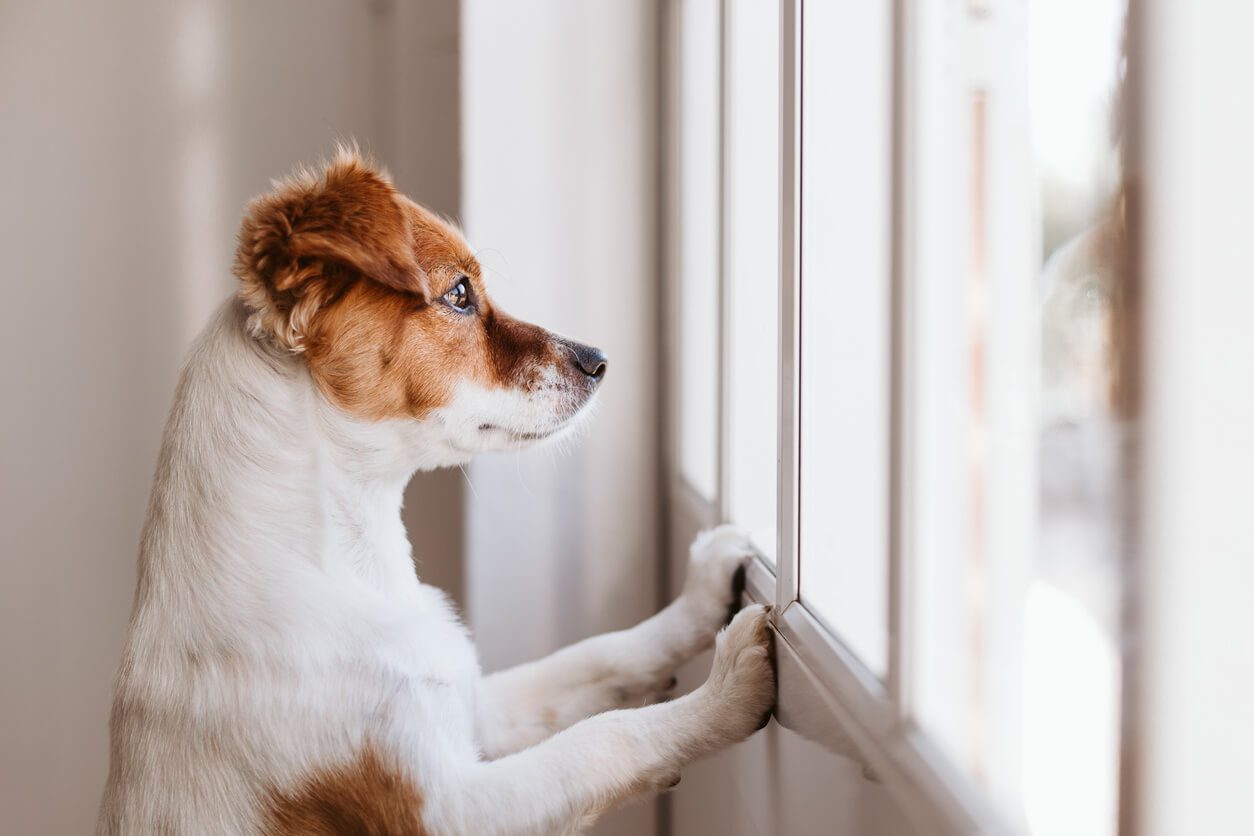Separation Anxiety & Pets: What You Need to Know in Chicago, IL

The COVID-19 pandemic has created a new normal for everyone, including our pets. One of the big changes is that pets have been able to enjoy more time with their people, more frequent walks for dogs, more mental stimulation, and in some cases, too many treats. As pet owners return to the office, children go back to school and opportunities to be out and about increase, some pets may find the change difficult. In those situations, pets may experience separation anxiety.
Behavioral Issues Can Be Signs of Separation Anxiety
At West Loop Veterinary Care, we help pet owners whose cats and dogs suffer from a variety of behavioral issues, including separation anxiety. Pets that suffer from separation anxiety typically exhibit behaviors such as:
- Excessive barking
- Inappropriate bathroom habits
- Destruction of items in the home
- Chewing or digging – especially at doors and window sills
- Stress-induced illness or health problems
- Attempts to escape through windows or doors

Cats and Separation Anxiety
Typically, we think of dogs when we discuss separation anxiety. While cats are known to appreciate their time alone on occasion, it’s important to be aware that some cats may suffer from separation anxiety. Cats, especially those who enjoy interaction with their owners, may find a sudden change in schedules difficult.
In addition to the behaviors listed above, cats suffering from separation anxiety may show behaviors such as increased hiding and episodes of vomiting or diarrhea.
Dogs and Separation Anxiety
Domestic dogs traditionally look to their humans for structure and order. While most dogs will go along with whatever schedule is set for them, sudden changes to their routine can result in boredom, anxiety, or fear. Dogs that have less structure and order may suddenly adopt the unwanted behaviors listed above. These signs of separation anxiety are especially common in puppies and active, energetic dogs.
Steps to Reduce the Risk of Separation Anxiety in Pets
Our veterinarians recommend several steps pet owners can take to reduce the risk of their pets developing separation anxiety.
Try to Remain Calm
If you’re nervous about leaving your dog behind or you take time to say a lengthy goodbye, your pet is going to pick up on this and get more nervous, too. Tell your pet goodbye briefly, remain confident as you get ready, and stroll out the door without hesitation. The more confident and calm you remain, the better your pet will respond to you leaving. It may take some time for you to see results, but results will likely come if you keep up with this.
Change up your departure habits. Don’t always pick up your keys and go. Sometimes, pick up your keys and just sit in a chair and watch television. You don’t want your pet to start anticipating your behavior.
Practice Makes Perfect – Positive Reinforcement
Try to gradually social distance from your dog by encouraging them to spend time in their own bed or in their crate while you perform tasks around the house. Make going into their bed or crate a pleasant experience by giving them a treat or toy to play with while they are in there. If they are prone to chewing up toys while unsupervised, this method may not be the best solution.
Reward your dog or cat when it is laying quietly on its own. Just drop a treat to them. Don’t talk to them or make a big deal out of it. Just drop the treat to help encourage the behavior you are glad to see.
Go to another room to work, take phone calls or have zoom meetings. Close the door behind you so the pet can’t be with you. Give them a treat when you close the door.
Over time, you can work on leaving them alone for longer stretches. Be sure to give them some treats when you return if they have behaved while you were away! Do this over a period of weeks. It’s not realistic to think your pet can go from you being home full-time to being gone for an extended period in just a matter of days.
Try Soothing Sounds
Some dog owners swear by leaving a TV or radio on for their pets; some believe this doesn’t make any difference. Generally, a TV or radio may not help pets settle down, since they are used to hearing those sounds throughout the day anyway. However, a white noise machine or a soothing song playlist may be able to help.
Play noises for your dog at a gentle volume, keeping in mind that your dog has better hearing than you do. Keep the white noise machine in your dog’s favorite room or near his crate, so they can feel more at ease while he is home alone.
Mental and Physical Stimulation
Make sure your pet continues to get plenty of exercise and mental stimulation by allowing enough time with your dog when you are present before leaving for work and after returning home. Be sure they get adequate walks, socialization, and playtime.
Consider hiring the services of a licensed dog walker to help facilitate your and your dog’s needs during work hours if you will be gone more than 4 to 6 hours. Or, if your dog is especially active, consider having them go to doggie daycare a couple of times a week.
Provide safe, interactive toys such as puzzle toys to mentally stimulate your pets. A puzzle toy stuffed with food or treats that can take a while to consume is especially helpful to give your dog as you leave. Make sure, however, that any toys cannot be swallowed or act as a choking hazard.
Anxiety Jackets Could Help with Dog Separation Anxiety in Chicago, IL
Some dogs do well with separation anxiety when they wear an anxiety jacket or calming shirt. This type of shirt provides deep pressure therapy and feels like a gentle hug. Although these shirts are most used for dogs with a fear of storms or fireworks, they can work well for separation anxiety too.
It’s not, however, a good idea to leave your dog in a anxiety jacket for more than a few hours. This may not be a good solution for a full day of work, but it can help during short errands.
Talk to Your Vet in Chicago, IL
Finally, if all else fails, talk to your veterinarian at West Loop Veterinary Care for more suggestions on how to deal with your pet’s separation anxiety. They may recommend non-medical solutions such as pheromones, supplements, and other items. In severe situations, they may prescribe medication to help calm your pet’s mind while you work with a trainer to help your pet learn new behaviors. Your veterinarian can help you figure out the best solution from here.
Although animals tend to prefer keeping to a routine, the good news is that most pets are pretty adaptive and can learn to be comfortable with new schedules. With an appropriate investment of time and effort, you and your pet should be able to overcome any separation anxiety issues and continue to experience a lifetime of enjoyment together.
If you have any further concerns or you need suggestions that are specific to your pet, please contact West Loop Veterinary Care in Chicago, IL at 312-421-2275 today. The right course of action can help prevent your pet from having any more separation anxiety attacks in the future.
West Loop:
(312) 421-2275
Streeterville:
(312) 766-5959
